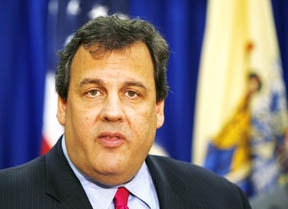The administration of Gov. Christopher Christie has begun to grade New Jersey’s municipalities on their management efficiencies and ability to conserve taxpayer dollars, and only municipalities that meet minimum standards set by the administration will receive their full state aid payments for this fiscal year.
Cities and towns throughout the state were informed on Aug. 25 they’d have to make the grade when they received a five-page “Best Practices” questionnaire from the Department of Community Affairs (DCA). The questionnaire includes 77 “yes-no” questions that try to measure the quality of administrative management, fiscal management, public safety, public works, energy management, municipal-school relations, and public health within each city and town in the state.
Eighty-eight is the highest possible score a municipality can achieve.
“Each municipality will need to meet an established percentage of the checklist items in order for all or part of your last state aid payment to be released.” – Lori Grifa
________
Grading will be based on the number of “yes” responses given. Cities that give 76 to 88 “yes” answers will get 100 percent of their state aid. But for municipalities that don’t make the grade, the impact is clear.
A score between 31 and 45 means the municipality will receive 97 percent of their final state aid payment. Municipalities that offer 15 or fewer affirmative answers will receive 95 percent of their final payment.
The questionnaires must be certified by municipal chief financial officers and are due back to the DCA on Oct. 1, according to Grifa.
The questions
The five-page form asks a variety of questions concerning shared services, long-range planning, bidding practices for professional services, recycling efforts, the annual budget process, and employee training and management, among many other topics.
A few of the specific questions include:
• In the last year, did you participate in any type of strategic planning process designed to help you restructure to reduce costs?
• Does your municipality limit health benefits to full-time employees (35 or more hours weekly), excluding from coverage all part-time employees, elected or appointed officials?
• Does your municipality maintain a minimum work year of 2,080 hours for all full-time employees?
• Does your municipality utilize some or all contract awards through the “Fair and Open” [process], versus the “Nonfair and Open” process?
• Do you participate in the purchase of fuel, electric, or gas in bulk through cooperative purchasing (county/state) and/or [are you] a member of a sustainable energy meeting, or any other similar group purchasing program?
Mayors: We’re not worried
When asked what they thought about the idea of tying state aid to a score earned on a questionnaire, some mayors in Hudson County evaded the question, preferring instead to focus on how prudently they already run their cities.
“We provided the best practices check list to all our directors, and we are in discussions to develop an action plan to follow as many of those best practices as possible,” said Hoboken Mayor Dawn Zimmer through her spokesman.
Hoboken received $8.73 million in state aid from Trenton this year.
However, other mayors, including Union City’s Brian Stack and Jerramiah Healy of Jersey City, seemed to welcome the intent of the survey.
“Union City already exercises fiscal prudence and I think that will be reflected on the form. I think it’s a good idea and it offers insight into the inner working of local government and how municipalities function,” said Mark Albiez, a spokesman for Stack.
Former Gov. Jon Corzine approved $11 million in special state aid to Union City just days before he left office in January.
A rep from Jersey City sounded a similar refrain when asked about the questionnaire.
“We have received the questionnaire from the state Division of Community Affairs and our fiscal office is currently working on preparing the answers,” said Jennifer Morrill, spokeswoman to Healy, in a statement issued after the questionnaire was sent out. “It appears that the state is looking to ensure that all of the 566 municipalities are following sound financial practices prior to allocating municipal aid. This is a valid step in working with municipalities, who like the state, are grappling with balancing budgets during one of the nation’s most difficult economic times.”
Like Union City, Jersey City also received special aid – $14 million – in the last days of the Corzine administration.
E-mail E. Assata Wright at awright@hudsonreporter.com.
